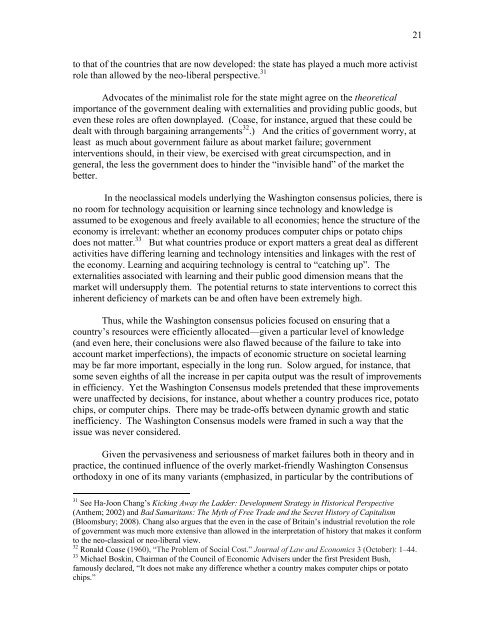Paper - Initiative for Policy Dialogue
Paper - Initiative for Policy Dialogue
Paper - Initiative for Policy Dialogue
You also want an ePaper? Increase the reach of your titles
YUMPU automatically turns print PDFs into web optimized ePapers that Google loves.
21<br />
to that of the countries that are now developed: the state has played a much more activist<br />
role than allowed by the neo-liberal perspective. 31<br />
Advocates of the minimalist role <strong>for</strong> the state might agree on the theoretical<br />
importance of the government dealing with externalities and providing public goods, but<br />
even these roles are often downplayed. (Coase, <strong>for</strong> instance, argued that these could be<br />
dealt with through bargaining arrangements 32 .) And the critics of government worry, at<br />
least as much about government failure as about market failure; government<br />
interventions should, in their view, be exercised with great circumspection, and in<br />
general, the less the government does to hinder the “invisible hand” of the market the<br />
better.<br />
In the neoclassical models underlying the Washington consensus policies, there is<br />
no room <strong>for</strong> technology acquisition or learning since technology and knowledge is<br />
assumed to be exogenous and freely available to all economies; hence the structure of the<br />
economy is irrelevant: whether an economy produces computer chips or potato chips<br />
does not matter. 33 But what countries produce or export matters a great deal as different<br />
activities have differing learning and technology intensities and linkages with the rest of<br />
the economy. Learning and acquiring technology is central to “catching up”. The<br />
externalities associated with learning and their public good dimension means that the<br />
market will undersupply them. The potential returns to state interventions to correct this<br />
inherent deficiency of markets can be and often have been extremely high.<br />
Thus, while the Washington consensus policies focused on ensuring that a<br />
country’s resources were efficiently allocated—given a particular level of knowledge<br />
(and even here, their conclusions were also flawed because of the failure to take into<br />
account market imperfections), the impacts of economic structure on societal learning<br />
may be far more important, especially in the long run. Solow argued, <strong>for</strong> instance, that<br />
some seven eighths of all the increase in per capita output was the result of improvements<br />
in efficiency. Yet the Washington Consensus models pretended that these improvements<br />
were unaffected by decisions, <strong>for</strong> instance, about whether a country produces rice, potato<br />
chips, or computer chips. There may be trade-offs between dynamic growth and static<br />
inefficiency. The Washington Consensus models were framed in such a way that the<br />
issue was never considered.<br />
Given the pervasiveness and seriousness of market failures both in theory and in<br />
practice, the continued influence of the overly market-friendly Washington Consensus<br />
orthodoxy in one of its many variants (emphasized, in particular by the contributions of<br />
31 See Ha-Joon Chang’s Kicking Away the Ladder: Development Strategy in Historical Perspective<br />
(Anthem; 2002) and Bad Samaritans: The Myth of Free Trade and the Secret History of Capitalism<br />
(Bloomsbury; 2008). Chang also argues that the even in the case of Britain’s industrial revolution the role<br />
of government was much more extensive than allowed in the interpretation of history that makes it con<strong>for</strong>m<br />
to the neo-classical or neo-liberal view.<br />
32 Ronald Coase (1960), “The Problem of Social Cost.” Journal of Law and Economics 3 (October): 1–44.<br />
33 Michael Boskin, Chairman of the Council of Economic Advisers under the first President Bush,<br />
famously declared, “It does not make any difference whether a country makes computer chips or potato<br />
chips.”














